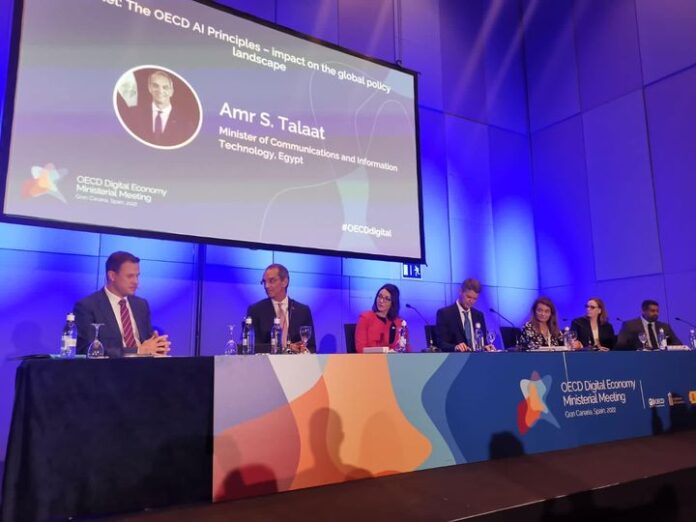Egypt: the MCIT (Ministry of Communication and Information Technology) Minister, Amr Talaat, attended the Ministerial Meeting of the OECD (Organization for Economic Co-operation and Development) yesterday, December 15.
During the Meeting, MICT Minster Amr Talaat delivered a speech to his fellow participants on the topic of “The OECD AI Principles – impact on the global policy landscape”,
in which he pointed out that “As the part of the Digital Economy Ministerial Meeting of the Organization for Economic Co-operation and Development (OECD), held in Gran Canaria, Spain, under the subject of “Directing recovery and economic growth in a long term vision by building a trusted, sustainable, and inclusive digital future.”
As per the recent updates from the event, the ministerial Meeting was attended by Ministers and government officials from 20 different countries, who put their inputs and thoughts during the Meeting and discussion of the panel.
On his part, Dr Amr Talaat pointed out and stressed Egypt’s keenness and positive response to cooperate with the international community in implementing the National Artificial Intelligence (AI) Strategy.
As per the officials of the MCIT Ministry, the state collaborates with OECD (Organization for Economic Co-operation and Development) along with the United Nations Educational,
Scientific and Cultural Organization (UNESCO) and important personnel of the Arab Working Group and African Working Group on AI to transfer the Egyptian experience and develop regional visions regarding AI policies.
Furthermore, the MCIT Minister, Talaat, cited that the Ministry of Communications and Information Technology (MCIT) focuses on the national priorities in implementing AI projects.
In his remarks, Talaat shed some light on the Egyptian ministry’s previous experience in AI. He highlighted the key efforts to implement the National AI Strategy in coordination with concerned authorities through the National AI Council chaired by MCIT.
He pointed out that all stakeholders, including civil society and government agencies, exerted national efforts to develop the strategy.
Moreover, Dr Amr Talaat briefed the most notable projects listed and implemented by the Applied Innovation Center (AIC) to implement state-of-the-art ICT technologies in finding solutions to the challenges faced by Egyptian society in several vital areas, such as health care, agriculture, and Arabic Natural Language Processing (NLP) – the Egyptian dialect.
Furthermore, projects to use AI in supporting decision-making are implemented in urban planning, groundwater management, macroeconomics, and others.
The ICT Minister emphasized digital capacity-building’s significance in preparing a talent pool in AI. Talaat added that Egypt joined the OECD recommendation on AI principles and translated a copy into Arabic to promote the regional dimension.
Talaat revealed that the nation is currently associating with OECD teams in the second phase to develop the AI strategy through Egypt-OECD Country Programme. He stressed the significance of establishing technological and scientific partnerships with OECD members to develop AI applications in different fields.
Additionally, The discussion session was attended by the Slovenian Minister of Digital Transformation Emilija Stojmenova Duh, the Director for AI and Digital Industry at the European Commission Lucilla Sioli,
Vice President for Global Public Policy at Amazon Web Services (AWS) Michael Punke, the CEO at Partnership on AI Rebecca Finlay, and President of Patrick J. McGovern Foundation Vilas Dhar.
Deputy Director General OECD Working Party moderated the session on AI Governance (AIGO), the Federal Ministry for Economic Affairs and Climate Action Marco-Alexander Breit.
The MCIT Minister attended a dinner party after that, which King Felipe VI of Spain held on the occasion of opening the OECD Digital Economy Ministerial Meeting. King Felipe VI of Spain invited the ministers participating in the Meeting to the dinner party.
In the end, it is noteworthy that OECD plays a significant role in the ICT sector by preparing studies and research that help governments compare different experiences and find solutions to common challenges.
This is in addition to coordinating national and international policies of countries and identifying good practices. MCIT presented two projects within the OECD Country Programme, including an AI-related project.

